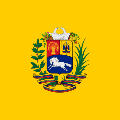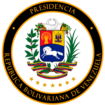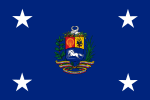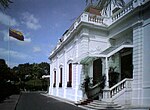President of Venezuela
This articleappears to beslanted towards recent events.(January 2023) |
| President of the Bolivarian Republic of Venezuela | |
|---|---|
| Presidente de la República Bolivariana de Venezuela | |
 | |
 Presidential seal | |
| Style | Mr. President (Señor Presidente) His Excellency (Su Excelencia) |
| Member of | Cabinet |
| Residence | La Casona(es) |
| Seat | Miraflores Palace,Caracas |
| Appointer | Popular vote election |
| Term length | Six years, no term limits |
| Inaugural holder | Cristóbal Mendoza(First Republic) José Antonio Páez(State of Venezuela) |
| Formation | 13 January 1830 |
| Deputy | Vice President |
| Salary | 4,068 USD monthly[1] |
| Website | presidencia.gob.ve |
 |
|---|
|
|
Thepresident of Venezuela(Spanish:Presidente de Venezuela), officially known as thePresident of the Bolivarian Republic of Venezuela(Spanish:Presidente de la República Bolivariana de Venezuela), is thehead of stateandhead of governmentinVenezuela.The president leads theNational Executiveof theVenezuelan governmentand is thecommander-in-chiefof theNational Bolivarian Armed Forces.Presidential terms were set at six years with the adoption of the1999 Constitution of Venezuela,and presidential term limits were removed in 2009.[2]
The office of president in Venezuela has existed since the 1811Venezuelan Declaration of Independencefrom theSpanish Crown;the first president wasCristóbal Mendoza.From 1821 to 1830, Venezuela was a member state ofGran Colombia,and the Venezuelan executive was absorbed by the Colombian government inBogotá.When theState of Venezuelabecame independent from Gran Colombia, the office of the president was restored underJosé Antonio Páez.Every head of state of Venezuela since then has held the title of president.
During the 19th century, Venezuela suffered political turmoil and autocracy, remaining dominated by regionalmilitary dictatorsuntil the mid-20th century. Since 1958, the country has had a series of democratic governments, as an exception where most of the region was ruled by military dictatorships, and the period was characterized by economic prosperity.
TheVenezuelan presidential crisiswas a political crisis concerning the leadership and who holds the office remained disputed until 5 January 2023. It began when the opposition-majorityNational Assemblydeclared that incumbentNicolás Maduro's2018 re-electionwas invalid and the body declared its president,Juan Guaidó,to beacting presidentof the country.[3]However, support for Guaidó declined following afailed uprising attempt in April 2019.[4][5]Efforts led by Guaidó to create a transitional government were unsuccessful, with Maduro continuing to control Venezuela's state institutions.[6][7][8]TheEuropean Unionstill does not recognize Maduro as the legitimate president, threatening his government with furthersanctions.[9]The interim government was dissolved in December 2022, when three of the four main political parties approved its dissolution to create a commission of five members to manage foreign assets, as the deputies sought a united strategy ahead of thepresidential electionsscheduled for 2024.[6]
Powers[edit]


As a self described republic with a presidential executive, Venezuela grants significant powers to the president. The president effectively controls the executive branch, represents the country abroad, and appoints the cabinet and, with the approval of theNational Assembly,the judges for theSupreme Tribunal of Justice.The president is also thecommander-in-chiefof theNational Bolivarian Armed Forces(FANB).
The powers and obligations of the president of Venezuela are established, limited and numbered by articles 236 and 237 of theconstitution:
- To comply with and enforce the Constitution and the law.
- To direct the activity of the Government.
- To appoint and remove theExecutive Vice-presidentand theCabinet Ministers.
- To direct the international relations of the Republic and sign and ratify international treaties, agreements or conventions.
- To direct the National Armed Forces in his capacity as Commander-in-Chief, exercise supreme hierarchical Authority over the same and establish their contingent.
- To exercise supreme command over the National Armed Forces, promote their officers at the rank of colonel or naval captain and above, and appoint them to the positions exclusively reserved to them.
- To declare states of exception and order the restriction of guarantees in the cases provided for under the Constitution.
- To issue executive orders having the force of law, subject to authorization in advance by an enabling act.
- To call special sessions of the National Assembly.
- To issue regulations for the application of laws, in whole or in part, without altering the spirit, purpose and reason for being of the laws.
- To administer the National Public Treasury.
- To negotiate national loans.
- To order extraordinary budget item in addition to the budget, subject to authorization in advance from the National Assembly or the Delegated Committee.
- To enter into contracts in the national interest, subject to this Constitution and applicable laws.
- To designate, subject to prior authorization from the National Assembly or the Delegated Committee, the Attorney-General of the Republic and the heads of the permanent diplomatic missions.
- To designate and remove those officials whose appointment is made subject to his discretion by the Constitution or the applicable law.
- To address reports or special messages to the National Assembly, either in person or through the executive vice-president.
- To formulate the National Development Plan and, subject to approval in advance from the National Assembly, direct the implementation of the same.
- To grant pardons.
- To determine the number, organization and competence of the Ministries and other organs comprising the National Public Administrative Branch, as well as the organization and functions of the Cabinet Ministers, within the principles and guidelines set forth in the pertinent organic law.
- To dissolve the National Assembly in the case contemplated by the Constitution.
- To call reference in the cases provided for under the present Constitution.
- To call and preside over meetings of the National Defense Council.
- Any others vested in the president under the Constitution and law.
Complements and compensations[edit]
The president's salary directly derives from the National Treasury, as stated in the Organic Law of Salaries, Pensions and Retirements of High Officials of the Public Power. During his or her tenure, the president may not be employed by anyone else, nor receive any other salary from the state. The president's salary is not to be superior to twelve monthlyminimum wages,[10]that is to say, 67,469.76VEF(as of February 2015).[11]
ThePresidential Honor Guard Brigadeof Venezuela is in charge of the president's protection, as well as the presidential family and their political peers. The Presidential Guard of Honor is made up of members from the four service branches of the National Bolivarian Armed Forces and other institutions of public security, and is headed by a general or flag officer.
Since 1900, the official workplace of the president is thePalace of MirafloresinCaracas.The presidential residence has been the palace of La Casona since 1964, instituted by presidentRaúl Leoni.La Casona is not used by incumbent presidentMaduro,who has decided not to inhabit it.[12]
- Presidential Palaces
History[edit]

The presidential designation encompasses only those persons who were sworn into office as President of Venezuela followingVenezuela's declaration of independencefromSpanish colonial rule,which took effect on 5 July 1811. The first president, taking office on 5 July 1811, was actually the president of atriumvirateof thefirst established Republic of Venezuelathat rotated the presidency weekly. The person serving as president during the week of 5 July was one of the three signatories of the Declaration of Independence:Cristóbal Mendoza.Mendoza shared the triumvirate with Juan Escalona and Baltasar Padrón. A secondtriumviratefollowed on 3 April 1812, whose members were Francisco Espejo, Fernando Toro and Francisco Javier Ustariz.[13][14]
Owing to the profound confusion of theVenezuelan War of Independenceand the period ofGran Colombiaover what is now Venezuela, this page has gaps between 1813 and 1819. For this period in time, historians refer to the Republic of Venezuela as theSecond Republic of Venezuela(1813–1814) and theThird Republic of Venezuela(1817–1819) asSimon Bolivartwice reestablished the republic. TheCongress of AngosturaappointedSimón Bolívar"Supreme Commander of the Republic of Venezuela" (Jefe Supremo de la República de Venezuela) from 1819 until 1830.
In 1830,José Antonio Páezdeclared Venezuela independent fromGran Colombiaand became president, taking office on 13 January 1830. Although he was not the first president of Venezuela (having in mindCristóbal Mendozain 1811), he was the first head of state of independent Venezuela, after the dissolution of Gran Colombia. From that point on, five constitutions were adopted, all slightly changing the extent of the president's powers and responsibilities.
During the 19th century, Venezuela suffered political turmoil and autocracy, remaining dominated by regionalmilitary dictatorsuntil the mid-20th century. Since 1958, the country has had a series of democratic governments, as an exception where most of the region was ruled by military dictatorships, and the period was characterized by economic prosperity.
Nicolás Maduroof theUnited Socialist Party of Venezuela(PSUV) entered the office asinterim presidenton 5 March 2013 after the death ofHugo Chávez,and was elected in the2013 presidential election.He was reelected in the2018 presidential election,which was disputed amid charges of irregularities including: the elections were held four months before the prescribed date,[15]multiple major opposition parties were banned from participating or imprisoned,[16]and there were charges of vote-buying.[17][18]
On 5 January 2019, theNational Assemblydeclared that—following the expiration of the mandate granted through the2013 presidential election—Maduro would have no constitutional mandate to govern Venezuela if he wassworn in on 10 January.[19]Article 233 of the Venezuelan Constitution establishes that in the event of a presidential vacuum, the president of the National Assembly takes charge of the presidency until a new election is called within 30 days. Noting that the 2018 presidential election failed to adhere to constitutional requirements, the National Assembly contend that Maduro's second term never began, and the seat is vacant.[20]
On 11 January,Juan Guaidóof thePopular Willparty and president of the legislature stated that he was prepared to take on the role of acting president.[21]With the National Assembly recognizing a vacuum in the office of the president,[22]and citing Article 233 of the Venezuelan Constitution,[20]Guaidó was declared acting president of Venezuela by that body on 16 January.[20]The legislature approved theStatute Governing the Transition to Democracy to Re-establish the Validity of the Constitution of the Bolivarian Republic of Venezuela(Spanish:Estatuto que Rige la Transición a la Democracia para Restablecer la Vigencia de la Constitución de la República Bolivariana De Venezuela) on 5 February, defining the timing of the transition.[23]
Maduro's controversial win and Guaidó's subsequent claim triggered theVenezuelan presidential crisis.The international community is divided on the issue of the Venezuelan presidency;[24]AP Newsreported that "familiar geopolitical sides" had formed, with allies Russia, China, Iran, Syria, and Cuba supporting Maduro, and the US, Canada, and most of Western Europe supporting Guaidó.[25]Moreover, theUnited Nationshas continued to recognize the Maduro presidency as the legal representative ofVenezuelaas of December 2019.[26][27]
In December 2022, three of the four main political parties (Justice First,Democratic ActionandA New Era) backed and approved a reform to dissolve the interim government and create a commission of five members to manage foreign assets, as deputies sought a united strategy ahead of thepresidential electionsscheduled for 2024,[6][28]stating that the interim government had failed to achieve the goals it had set.[29]
Requirements[edit]
According to articles 227 and 229 of theConstitution of Venezuela,adopted in 1999, the following requirements must be met in order to become President of Venezuela:[30]
- Being a Venezuelan citizen from birth and possessing no other nationality.
- Being at least 30 years old at the time of the election.
- Not being a subject to any conviction by final judgment.
- Not being a Minister, governor, mayor, or the vice president of the Republic from the day the candidacy is announced to the day of the election.
Term limits[edit]
The current presidential term is for six years with the constitutionally guaranteed recourse of holding a popular recall referendum any time within the last three years of a presidential term. A2009 referendumremoved the previous restrictions which limited the president to 2 terms.[2]
From 1958 to 1999, the presidential term was set at five years. A sitting president was not only barred from immediate reelection, but could not run again for 10 years (equivalent to two full terms) after leaving office.
Recall[edit]
This sectionneeds expansion.You can help byadding to it.(July 2016) |
The president may berecalledafter a specific time in office.
Office-holders[edit]
Presidents of Venezuela who served under the1864 constitution(starting withJuan Crisóstomo Falcón) bore the title of "President of the Union", instead of the usual "President of the Republic" still used today. Aside from that, all heads of state of the country since 1811 have held the title of "President of Venezuela", with minor variations regarding the official name of the country (which has changed four times since the restoration of the independence in 1830).
Latest election[edit]
| Candidate | Party | Votes | % | |
|---|---|---|---|---|
| Nicolás Maduro | United Socialist Party of Venezuela | 6,248,864 | 67.85 | |
| Henri Falcón | Progressive Advance | 1,927,958 | 20.93 | |
| Javier Bertucci | Esperanza por El Cambio | 989,761 | 10.75 | |
| Reinaldo Quijada | Popular Political Unit 89 | 43,194 | 0.47 | |
| Total | 9,209,777 | 100.00 | ||
| Valid votes | 9,209,777 | 98.11 | ||
| Invalid/blank votes | 177,672 | 1.89 | ||
| Total votes | 9,387,449 | 100.00 | ||
| Registered voters/turnout | 20,526,978 | 45.73 | ||
| Source:CNE,IFES | ||||
See also[edit]
- List of presidents of Venezuela
- List of vice presidents of Venezuela
- History of Venezuela
- Politics of Venezuela
Notes[edit]
References[edit]
- ^"Shocking Gap Between Latin America's Presidential Salaries And Workers Minimum Wage".Latin Post.
- ^ab"Chavez wins chance of fresh term".BBC News Online(in Spanish). Caracas. 16 February 2009.Retrieved2 January2016.
- ^"El Tribunal Supremo de Justicia de Venezuela declara" inconstitucional "a la Asamblea Nacional y anula el nombramiento de Juan Guaidó como su presidente".Retrieved29 January2019.
- ^*Rodríguez, Jesús A (8 May 2019)."We are going to take over the premises".Politico.Retrieved10 May2019.
In Venezuela, though the number of people who say they recognize Guaidó as the legitimate president has dwindled to about 50 percent since January, his approval remains much stronger than Maduro's abysmal 4 percent.
- Wyss, Jim (6 May 2019)."As Guaido's popularity in Venezuela begins to dwindle, what's next for the opposition?".Miami Herald.Chicago Tribune.Retrieved10 May2019.
... last week's failed military uprising and a spate of violent but fruitless demonstrations have some wondering if Guaido, and the opposition at large, have what it takes to oust Maduro... A poll released Monday by Caracas-based Meganalisis found that Guaido's approval ratings dropped to 50 percent, down from 84 percent in January. He's still far more popular than Maduro whose approval rating is at 4 percent but the precipitous drop can't be ignored...
- Casoni, Giampiero (7 May 2019)."Venezuela, il gradimento di Guaidò cala a picco: meno 34% in soli tre mesi".Ci Siamo(in Italian).Retrieved10 May2019.
The popularity of Juan Guaidò is in sharp decline and the 'liberator' of Venezuela seems to have exhausted the original propulsive thrust... At the center of this drop in consensus, especially the failure (because of its failure) of the coup in recent weeks...
- Wyss, Jim (6 May 2019)."As Guaido's popularity in Venezuela begins to dwindle, what's next for the opposition?".Miami Herald.Chicago Tribune.Retrieved10 May2019.
- ^"Trump Weighs More-Muscular Venezuela Moves on Doubts Over Guaido".Bloomberg News. 6 December 2019.Retrieved9 December2019.
- ^abcArmas, Mayela (31 December 2022)."Venezuela opposition removes interim President Guaido".Reuters.Retrieved31 December2022.
- ^Rodriguez Montilla, Camille; Rueda, Manuel (30 December 2022)."Venezuelan opposition strips Guaidó of 'presidential' role".Associated Press.Retrieved4 November2023.
- ^Herrera, Isayen; Turkewitz, Julie (22 December 2022)."Guaidó, the Face of Opposition in Venezuela, May Be on His Way Out".The New York Times.Retrieved4 November2023.
- ^Emmott, Robin (6 January 2021)."EU no longer acknowledges Venezuela's Guaido as interim president".Reuters.Retrieved7 January2021.
- ^"Ley Orgánica de Emolumentos, Pensiones y Jubilaciones de los Altos Funcionarios del Poder Público"(PDF).Official Gazette of the Bolivarian Republic of Venezuela(in Spanish). Caracas. 12 January 2011. Archived fromthe original(PDF)on 30 December 2016.Retrieved3 January2016.
- ^"Oficializan aumento de 15% del salario mínimo".El Universal(in Spanish). Caracas. 9 February 2015.Retrieved3 January2016.
- ^"Presidente Maduro aclaró rumores sobre presencia de familia Chávez en La Casona".Noticias Candela(in Spanish). 6 December 2013.Retrieved3 January2016.
- ^(in Spanish)"Presidentes de Venezuela".Consulado General de Bucaramanga. Archived fromthe originalon 5 August 2002.
- ^Briceño Perozo, Mario. "Mendoza, Cristóbal de" inDiccionario de Historia de Venezuela,Vol. 3. Caracas: Fundación Polar, 1999.ISBN978-980-6397-37-8.
- ^"Venezuela opposition weighs election run".BBC News.8 February 2018.Retrieved8 February2018.
- ^"ANC aprobó un decreto para la validación de los partidos políticos".El Nacional.20 December 2017.
*Olmo (@BBCgolmo), Guillermo D. (10 January 2019)."Por qué es polémico que Maduro jure como presidente de Venezuela y por qué lo hace ahora si las elecciones fueron en mayo".BBC News Mundo.Retrieved11 January2019.
*"Maduro gana con la abstención histórica más alta en comicios presidenciales – Efecto Cocuyo".efectococuyo.21 May 2018. Archived fromthe originalon 21 December 2018.Retrieved11 January2019.
*"Venezuela opposition banned from running in 2018 election".BBC News.11 December 2017. - ^"Maduro eyes re-election as Venezuela fires starting gun for presidential vote".The Guardian.23 January 2018.Retrieved7 February2019.
- ^"Venezuela's Maduro re-elected amid outcry over vote".Reuters.20 May 2018.Retrieved7 February2019.
- ^"Venezuela's parliament rejects legitimacy of Maduro second term".The Straits Times.6 January 2019.Retrieved28 January2019.
- ^abcBello, Camille (27 January 2019)."Is it legal for Juan Guaidó to be proclaimed Venezuela's interim president?".Euronews.Retrieved28 January2019.
- ^Smith, Scott (12 January 2019)."Maduro foe says he's ready to replace the president".Associated Press.Retrieved24 February2019.
- ^Armas, Mayela; Pons, Corina (15 January 2019)."Update 3-Venezuela Congress declares President Maduro 'usurper' of democracy".CNBC.Retrieved24 February2019.
- ^Brito, Estefani (8 February 2019)."El estatuto que rige la transición entró en vigencia el martes"[The statute governing the transition took effect on Tuesday].El Nacional(in Spanish).Retrieved9 March2019.
- ^"Guaido vs Maduro: Who backs Venezuela's two presidents?".Reuters.24 January 2019.Retrieved5 February2019.
- ^Vasilyeva, Nataliya (24 January 2019)."Venezuela crisis: Familiar geopolitical sides take shape".AP News.Retrieved25 February2019.
- ^"UN backs credentials of Maduro officials".EFE(in Spanish). 19 December 2019.Retrieved20 December2019.
- ^"Report of the Credentials Committee".United Nations General Assembly.Retrieved29 January2020.
- ^Martínez, Deisy (30 December 2022)."AN de 2015 aprueba su extensión por otro año y elimina gobierno interino"[2015 NA approves its extension for one more year and eliminates interim government].Efecto Cocuyo(in Spanish).Retrieved31 December2022.
- ^"Mayoría de la AN-2015 ratifica disolución del Gobierno interino".Tal Cual(in Spanish). 30 December 2022.Retrieved31 December2022.
Hemos tenido algo que pasó de ser provisional a convertirse en algo perpetuo. Y no se celebraron las elecciones, de manera que el artículo 233 perdió su razón de ser para justificar el gobierno interino.
- ^Constitution of the Bolivarian Republic of Venezuela, Chapter 11 – National Executive Power
External links[edit]
- Official website of the Presidency of VenezuelaArchived21 January 2016 at theWayback Machine(in Spanish)
- Official website of the Venezuelan Government(in Spanish)




